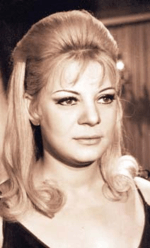Nadia Lutfi
| Nadia lotfy | |
|---|---|
 | |
| Born |
Paula Mohamed Mostafa Shafiq 3 January 1934[1] Egypt |
| Spouse(s) |
Ibrahem Sadek Mohamed Sabry Adel El Bashary |
Nadia Lutfi (born Paula Mohamed Mostafa Shafiq; 3 January 1934)[1] is a retired Egyptian actress. She is the daughter of an Egyptian father who was an accountant and a Turkish mother. In her prime, she was one of the most popular actresses during the final phase of Egyptian cinema's "Golden Age".
Life and career
Nadia began acting as a hobby; when she was 10 years old she participated in a play at her school and did very well. When the 24-year-old was about to make her screen debut in 1958, Omar Sharif was the reigning king of the Arab cinema, and his wife, Faten Hamama, its queen. The star couple had just had a smash hit with the film La Anam with Hamama as "Nadia Lotfy", a willful teen who destroys her father's marriage. Young Paula appropriated the name.
With her fresh new name, the young actress took her first role in a modest, black & white drama, Soultan. Her second picture was a smaller role in one of the film landmarks of its time, Cairo Station. In 1963, she played a Frankish woman warrior of the Crusade era, donning full armor to go into battle against her Christian-Arab lover, in Naser Salah el Dine (occasionally shown on US TV as Saladin and the Great Crusades).
In Lil-Rigal Faqat (1964), Lutfi and co-star Su'ad Husni played women geologists who, denied employment, respond by disguising themselves as men and going to work, where they find they have to suppress their romantic natures to sustain the disguise. In the mid-1960s, she starred in two films that were based on stories by Nobel-winning author Naguib Mahfouz, just a few years following the publication of his widely banned novel of Moses, Jesus and Mohammed, Children of Gebelawi. Lutfi finished the decade starring in 1969's Abi foq al-Shagara, as a night club dancer who beds a much younger man, then discovers that she once knew his father equally well.[2]
She starred in several films with Soad Hosni, like Al-Saba' Banat (The Seven Girls).[3] [4]
In the 1970s, her career wound down as Egypt's "Golden Age" for films came to a close. Having made close to 50 films in the first 11 years of her career, she only made three in the decade that followed, and has not worked in film since 1981. In 2006, she returned to the spotlight when a video by young Lebanese singer Nourhanne recreated a musical scene from one of her first films, Bain al Qasrayn.
| Wikimedia Commons has media related to Nadia Lutfi. |
Footnotes
- 1 2 Some sources cite 1937
- ↑ Nadia Lutfi at the Internet Movie Database
- ↑ , Soad Hosni's Filmography, Al-Ahram Weekly Online, 28 June - 4 July 2001, Issue No.540
- ↑ , English Article titled “Soad Hosni “, 2015, Accessed 2015/08/28.